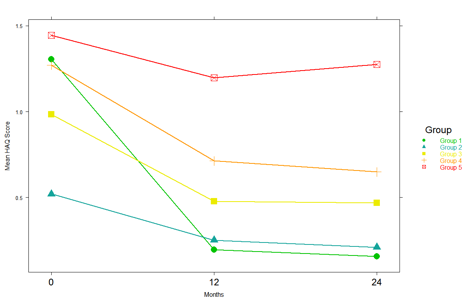Session Information
Session Type: ACR Poster Session A
Session Time: 9:00AM-11:00AM
Background/Purpose: Disease
trajectories in early rheumatoid arthritis (ERA) are characterized by
differences in absolute levels of disease activity and rates of improvement, with
patients in the worse disease trajectories experiencing worse quality of life
outcomes and persistent fatigue. Our objective was to
determine if the
magnitude of improvements in physical function, as measured by the Health
Assessment Questionnaire (HAQ), also vary in the heterogeneous disease
trajectories.
Methods: Cluster-based
trajectory modeling identified 5 mutually exclusive ERA disease activity
trajectories by posterior membership probability using DAS28 over 24 months
(described in Table 1). Baseline values and mean changes in
the HAQ scores were examined for differences by trajectory group using ANCOVA, with adjustment for covariates (age, sex, number of comorbidities, low
income, smoking, race).
Results: The cohort includes 1586 patients (mean 54 years, 181 days of
symptoms, 73% female, 82% Caucasian, 18% smokers, 70% seropositive). Half (50%)
begin in high disease activity state (DAS), of which only 20% rapidly reach remission
(Group 1). Group 5 only achieves moderate disease activity by 24 months,
despite higher frequency of use of steroids and biologic therapy. HAQ scores were similar
between Groups 1, 4 and 5 at baseline (Table 1). In Group 1 scores improve by
1.08 (SD 0.68) by 12 months but in Group 5 the HAQ fails to reach the minimal
clinically important difference for improvement (0.22) and worsens from month
12 to 24 (Figure 1).
Conclusion: Novel strategies are needed to identify
which patients are at risk for disparate outcomes so that effective care plans
can be enacted to preserve function.
|
Table 1. Mean (SD) HAQ Scores at Baseline and Change Over 24 Months, by Trajectory Group
|
||
|
Baseline |
Change |
|
|
Group 1 (HDAS to REM) |
1.21 (0.70) |
-1.08 (0.68) |
|
Group 2 (MDAS to REM) |
0.54 (0.53) |
-0.34 (0.51) |
|
Group 3 (MDAS to LDAS) |
0.83 (0.62) |
-0.34 (0.61) |
|
Group 4 (HDAS to LDAS) |
1.39 (0.65) |
-0.71 (0.78) |
|
Group 5 (HDAS to MDAS) |
1.34 (0.64) |
-0.13 (0.66) |
|
Legend: HDAS high disease activity state; REM remission; MDAS moderate disease activity state; LDAS low disease activity state |
||
Figure 1. HAQ Scores by Trajectory
Group, months 0-24
To cite this abstract in AMA style:
Barnabe C, Sun Y, Bartlett SJ, Boire G, Hitchon C, Keystone EC, Haraoui B, Thorne JC, Tin D, Pope JE, Bykerk V. Early Rheumatoid Arthritis Patients in the Worse Disease Trajectory Group Fail to Achieve Improvement in Physical Function [abstract]. Arthritis Rheumatol. 2015; 67 (suppl 10). https://acrabstracts.org/abstract/early-rheumatoid-arthritis-patients-in-the-worse-disease-trajectory-group-fail-to-achieve-improvement-in-physical-function/. Accessed .« Back to 2015 ACR/ARHP Annual Meeting
ACR Meeting Abstracts - https://acrabstracts.org/abstract/early-rheumatoid-arthritis-patients-in-the-worse-disease-trajectory-group-fail-to-achieve-improvement-in-physical-function/

